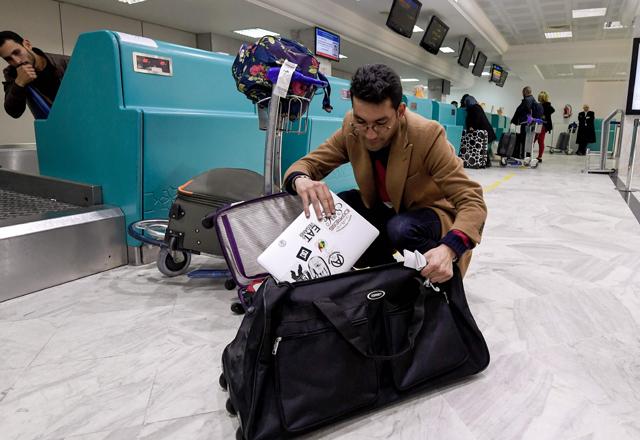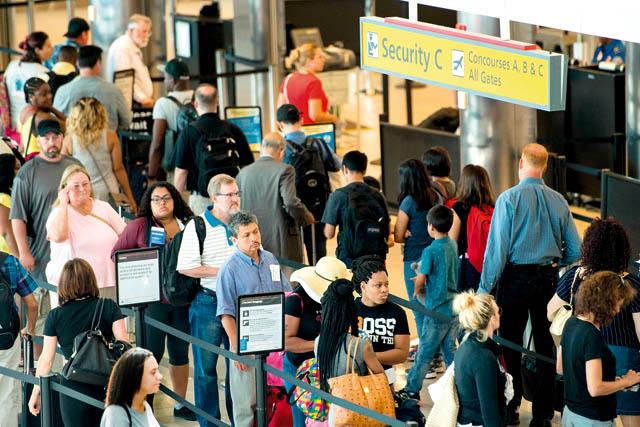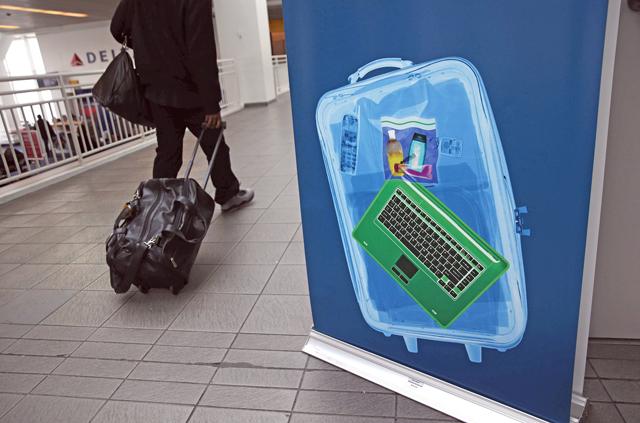You are here
Weary flyers shrug as Middle East laptop ban takes off
By AFP - Mar 25,2017 - Last updated at Mar 25,2017

A Libyan traveller packs his laptop in his suitcase before boarding his flight for London at Tunis-Carthage International Airport on Saturday (AFP photo)
DUBAI — A controversial ban on carry-on laptops and tablets on flights from the Middle East to the United States and Britain went into effect Saturday — with less fanfare and frustration than expected.
From Dubai to Doha, passengers on dozens of flights checked in their electronic devices, many shrugging off the measure as yet another inconvenience of global travel.
"It's a rule. I follow the rules," said Rakan Mohammed, a Qatari national who flies from Doha to the US two to three times a year.
"The bigger problem for my family is the no smoking. On a long flight, they become restless after three hours."
At Dubai International, one of the world's busiest hubs, flag carrier Emirates dispatched staff to guide passengers through one of the most intense travel weekends of the year.
Around 1.1 million people are expected to pass through as the city marks UAE spring break, Dubai Airports said.
An estimated 260,000 travellers were expected each day from Friday through Monday. Dubai International Airport expect 89 million passengers this year.
Staff in red suits could be seen at the airport Saturday carrying signs explaining the electronics ban, ready to appease travellers with games and activities for children.
Government-owned Emirates, which operates 18 direct flights to the US daily, also began a service to enable passengers to use their electronic devices after check-in and until boarding.
Samuel Porter, who was travelling out of Dubai with his family, nonetheless decided to "avoid delays" at the airport by putting his laptop in the hold.
"The only issue is the kids. I have two kids and the iPad is always in their hands. Maybe they will watch a documentary and learn something useful this time", he told AFP.
The United States this week announced a ban on all electronics larger than a standard smartphone on board direct flights out of eight countries across the Middle East.
US officials would not specify how long the ban will last, but Emirates told AFP that it had been instructed to enforce the measures until at least October 14.
The ban covers electronics sold at Dubai Duty Free, Dubai Airports CEO Paul Griffiths said earlier this week.
'Do what they say'
Adding to the disruption on Saturday, a number of flights out of Dubai and Abu Dhabi airports were delayed due to thunderstorms, including an Emirates flight to Houston.
Travellers using 10 airports across the Middle East and North Africa are subject to the ban.
Britain has also announced a parallel electronics ban, effective Saturday, targeting all flights out of Egypt, Turkey, Jordan, Saudi Arabia, Tunisia and Lebanon.
Passengers readying to fly to the UK out of Tunisia Saturday were sceptical, but compliant.
"I think it's bizarre. I don't get it," said Paul, a British tourist on his way home. "I'm also concerned about the security of my own computer... but what can you do."
"You do what they tell you to do and keep quiet," said Khairi, a British-Libyan dual citizen flying out of Tunis.
Royal Jordanian, which operates direct flights to London, New York, Detroit and Chicago, poked fun at the ban on its social media accounts.
The airline suggested alternative in-flight activities, including doing "what we Jordanians do best... stare at each other!"
The restrictions have come under criticism for targeting majority-Muslim countries.
The US ban in particular has raised eyebrows for covering airports from which American airlines do not operate direct flights.
But the United States and Britain have cited intelligence indicating passenger jets could be targeted with explosives planted in such devices.
Turkish airports began enforcing the ban Saturday, with national carrier Turkish Airlines offering a similar laptop stowage service to Emirates.
Abu Dhabi, home of UAE national carrier Etihad Airways, is one of the few international airports with a US Customs and Border Protection Facility, which processes immigration and customs inspections before departure.
But those flying to the US from Abu Dhabi will still need to check in their electronics, Etihad said.
Related Articles
DUBAI — The United States has ended a four month ban on passengers carrying laptops onboard US bound flights from certain airports in the Mi
DUBAI — Travellers across the Middle East expressed frustration Wednesday at a ban on large electronic devices for flights to the United Sta
WASHINGTON — The Trump administration on Tuesday imposed restrictions on carry-on electronic devices on planes coming to the United States f



















